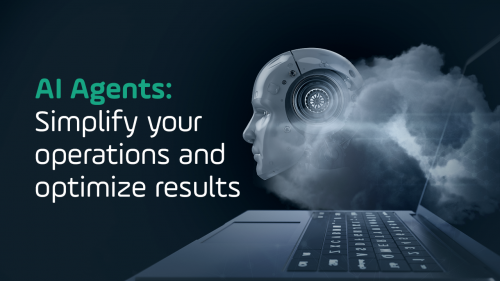AI Agents: Simplify Your Operations and Optimize Results

We live in an era where efficiency and agility are essential for staying competitive in business. Companies that want to optimize their operations and offer high-level customer experiences need to rely on innovative solutions — and AI agents are emerging as one of the most powerful tools in this context.
But what exactly are AI agents? These are intelligent systems that use machine learning and automation to perform tasks autonomously. Unlike traditional software, these agents can learn from interactions, identify patterns, and continuously improve performance. They can operate in various areas — from customer service to data management and system integration.
The growth of this technology is remarkable. According to Statista, the global market for AI agents is expected to grow at 35% per year by 2030. That means more and more businesses are adopting these solutions to enhance efficiency and streamline operations.
If you want to discover how AI is revolutionizing industries, speeding up processes, and reducing costs, keep reading to explore benefits and real-world applications of AI agents.
Practical Benefits of AI Agents
Adopting AI agents brings a wide range of benefits for companies of all sizes. Here are some of the key advantages:
1. Cost Reduction
Automating tasks significantly reduces operational costs. Repetitive processes like customer service and inventory management can be optimized using AI, lowering the need for manual labor and allowing teams to focus on strategic tasks.
2. Increased Efficiency
Unlike humans, AI agents operate 24/7 without interruptions, ensuring continuous workflows, minimizing errors, and increasing productivity. Real-time data analysis also allows for quicker, more informed decision-making.
3. Personalized Customer Experiences
Companies using AI can offer highly personalized experiences. AI agents analyze preferences and behavior patterns to provide tailored recommendations and solutions. A Zendesk study found that businesses using AI in customer support report significantly higher customer satisfaction levels.
Use Cases for AI Agents
AI agents can be implemented across a wide variety of sectors and business processes. Here are some practical examples:
1. Customer Service
Smart chatbots are transforming how companies interact with consumers. Platforms like Zendesk AI can reduce customer support costs by up to 30%, automating FAQs and accelerating response times.
2. Data Management
Tools such as DataRobot help businesses predict demand and manage inventory more accurately. By analyzing historical and behavioral data, these agents optimize production planning, reduce waste, and improve resource management.
3. System Integration
Workflow automation is crucial for businesses that use multiple platforms. Solutions like Zapier integrates CRMs, ERPs, and marketing tools to ensure all departments stay connected and operate efficiently.
How to Implement AI Agents in Your Business
If your company wants to adopt AI agents, a structured plan is essential. Here are the steps for a successful implementation:
Step 1: Identify Processes That Can Be Automated
Pinpoint which areas of your business would benefit the most from automation. Customer support, data analysis, and system integration are great places to start.
Step 2: Choose a Reliable Platform
There are many tools available, each designed for specific needs. Platforms like Zendesk, DataRobot, and Zapier are widely used for AI-based automation.
Step 3: Integrate and Monitor Results
After implementation, it’s important to track the performance of your AI agents and fine-tune settings to ensure they align with your business goals.
Ready to Optimize Your Business?
AI agents are indispensable tools for companies striving for efficiency, innovation, and competitiveness. With their ability to reduce costs, automate processes, and enhance the customer experience, they represent the future of business operations.
Mouts TI specializes in implementing smart solutions tailored to your business needs.
Contact us today and discover how AI agents can boost your operations!
Related news
Innovation, the global market and divers topics about the technology universe are currently available on our blog.
 Cases
Cases
Big Data in energy: how to manage data in the energy sector?
The energy sector is one of the fundamental pillars of the global economy, driving everything from large industries to domestic consumption. With the advancement of digital technologies, the amount of data generated in this sector has increased exponentially, making Big Data an essential tool for companies seeking to stand out in a competitive market. But how to collect and analyze this data effectively? And what are the benefits of a well-done analysis?
 Cases
Cases
Energy and sustainability: 3 innovative technologies in the energy sector
Sustainability has become a central issue in the energy sector, driven by the need to reduce environmental impact, ensure energy security and meet growing demands for cleaner energy sources. With increasing pressure to reduce carbon emissions and adopt more sustainable practices, the sector faces significant challenges, but also promising opportunities.
 Cases
Cases
Why is cloud migration important for the energy sector?
Energy market professionals can already see that the sector is undergoing a significant transformation, driven by the need for greater efficiency, sustainability, and innovation. Amid these changes, cloud migration has stood out as one of the main strategies for companies looking to optimize their operations, reduce costs and improve collaboration.
